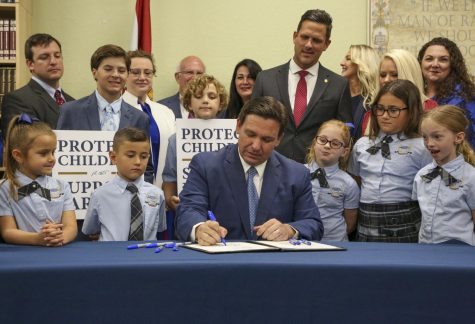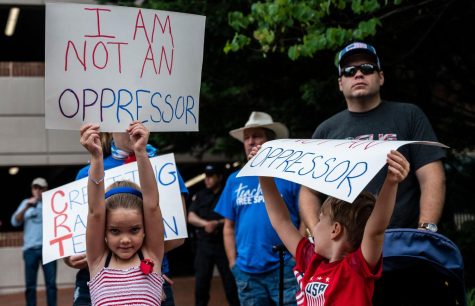Legislation to Change Education System: Could Missouri be next?
March 31, 2022
Indiana. Florida. Texas. These states and others are all debating bills relating to increased parental oversight of public schools. With this ideology spreading across the country, many are asking if our state could be next. Our state won’t be next because they are already here.
Bills across the Nation
Before taking a look at the bill in Missouri, it is vital to see where these bills came from. In nearly 20 states across the country, lawmakers have proposed bills that change public education as we know it.
One of the bills that have gotten the farthest is Indiana HB1134. The bill limits what teachers can say on the topic of race, gender, sexual orientation and political parties. For those teachers who try to break the law, they will not only be fired, but could face prison time. This means that History, English and other humanities classes would be significantly changed. A student would have less exposure to African- American issues and political ideology and no exposure LGBTQ+ history.
Additionally, the bill would require written parental consent for non-academic conversations. This would mean students can’t come to teachers for socio-emotional support or even just to talk about their day. This would make it nearly impossible for students whose parents did not give consent to make a meaningful connection with their students. Students who depend on school to be their safe place would no longer be able to speak with their teachers about their issues. It would disproportionately affect LGBTQ+ students who come from homes that are not supportive as many of those students depend on teachers to talk with. Milo Shomaker, a transgender student, came out to teachers before coming out to his family.

“Telling my parents was one of the most terrifying things I ever did. And I would say, had I not had that option. I probably wouldn’t have come out at school. I would have probably stayed closeted through the entire I might not even come out to some of my friends. And I would think that my high school experience would be a lot lot worse. And it would be a lot more painful,” Shomaker said.
Students depend on these interactions to make meaningful connections as they try to find themselves. A recent Trevor Project survey found that 42% of LGBTQ youth seriously considered attempting suicide in the past year, including more than half of transgender and nonbinary youth. This staggering statistic shows just how vital it is for these students to have a safe person.
The final big portion of the bill deals with teachers publishing their curriculum for parental review and approval. According to the bill, teachers would have to place their daily curriculum on a portal on June 30 before the start of the year. Parents will be able to approve and revise the curriculum. Once their curriculum is approved they can not deviate from the daily plan. English teacher Libby Reed described the problems with this plan.
“One of the best things about teaching, and one of the things that all good teachers do is respond to their student needs. If I present something and realize that it’s going to take a lot longer, because my students aren’t ready to move on, then I’m going to not move on…I think those bills are more frightening to me, because they’re they’re making the job nearly impossible, [and] adds a level of difficulty to the to the work,” Reed said.
In Florida, “The Parents Rights in Education Bill,” nicknamed “The Don’t Say Gay Bill” by critics, passed and is headed to the governor’s desk. The bill reads, “sexual orientation or gender identity may not occur in kindergarten through grade 3 or in a manner that is not age appropriate or developmentally appropriate for students in accordance with state standards.”
In a removed section of the bill, teachers would have been required to out children to their parents even if the teacher feared the student may be abused or in danger.
Governor Ron DeSantis signed the law on March 28th.
The bill has sparked outrage among the LGBTQ+ community as they say it is a clear attack on their history. Students have organized and staged walkouts in response to the bill as a way to stand as allies and show the state house the effect this will have.
The largest employer in the state, Disney, faced mass walkouts due to their inaction on the bills.
But his is only two bills in two states. Across the nation, bills are creeping into the legislature, sending a message that more are to come, including here in Missouri.
Missouri Bills
“These bills are already here. Today we had a bill dealing with these issues. One about curriculum approval, and others limiting what teachers can say,” said Missouri Representative Paula Brown, the Ranking Minority Member on the House Elementary and Secondary Education Committee.
Currently, there are at least 15 bills in the Missouri legislature trying to pass a version of a Parent Bill of Rights. This bill would give parents explicit rights when it comes to public education.

Supporters of the bill say it requires more oversight of public education. However, those opposed say that it creates an undue amount of stress for teachers.
Due to the extensive number of bills this article will just focus on two, but there are more: HB 1755, HB 1858, HB 2068, HB 1474, HB 1995, HB 1474.
Many of these bills require teachers to post their lesson plans and curriculum to a portal for parental review. Parents will be able to review the defined curricula and opt out of the course via a DESE form and provide comments and reasoning for their opting out under HB 1995 & 1474 line 88-95. While it is not as extreme as the bill in Indiana that offered an option for parents to revise the curriculum, critics say it still gives parents too much control.
“I think that the idea that I would have to have all my daily lessons and texts approved by a committee of parents… is frightening to me, because they’re making the job nearly impossible. … One of the things that all good teachers do is respond to their student needs, so if I present something and realize that it’s going to take a lot longer… I am not going to move on,” Reed said.
But under this plan teachers would not be able to do this. They would have to plan their schedule out to the day and if they deviate they can face being fired.
In addition to posting the curriculum “the portal” will have all professional development material.
All of these bills come as a response to two main issues: Critical Race Theory and LGBTQ issues.
Main Focuses of the Bills
Some of these bills target an idea called Critical Race Theory. But what is critical race theory. Kemba Metropoulos, English Teacher and former attorney, explains what the idea is.

“[Critical race theory is used to] understand how sometimes there were people who would create laws to further their agenda, versus creating laws that would be in the best interest of every single American in our country, and every citizen or anyone who set foot on our territory. So when you learn that, [it] makes you see the

law a little differently… it’s hard enough for people in law school, and their second year or third year law school, to understand the nuances of critical race theory, how it applies the law, and how people are affected.”
While most legal experts agree that this type of instruction is not being taught in most schools, some believe history is extensively taught through this lens.
The other issue that is targeted in these bills is LGBTQ+ issues.
Currently, few bills are far enough along in the Missouri State legislature to be notable regarding LGBTQ+ education; however, one regarding transgender students playing sports has gained traction.
Senate Bill 781 states, “No athletic team or sport designated for females, women, or girls shall be open to students of the male sex, as assigned at birth.” additionally schools that try to get around this law will not be eligible for state funding. Shomaker described the detrimental effects of not being able to participate in a sports team of their gender identity. “To be announced publicly as a woman every single time you want to, or man every single time you want to like engage in activity that you love…it would just become so painful, but you know, they probably wouldn’t want to participate in the activity anymore,” Shomaker said.
Impacts
Supporters of the bills wish for teachers to make teachers and districts liable what is being taught in the classroom.
“Teacher’s fears are legitimate; they can face lawsuits and even criminal charges for teaching,” said Representative Brown.
Currently, we do not know how much would change for classrooms if these bills pass, but their would definitely be some changes. Parents

would definitely have more oversight in the classroom, and controversial topics would probably be avoided. And this would cause a lot of undue stress for teachers.
Earlier this year, Parkway gave them a bonus and some additional time off to help teachers focus on their mental health, reduce stress and combat
burnout caused by the pandemic and the current political climate.
As these bills have progressed, organizations have developed plans for if these bills pass.
The college board released a statement saying that they would not change their curriculum for AP classes that these bills would affect.
Parkway’s Teacher Union, NEA, has already been preparing for the possibility of these bills.
“Missouri NEA is aware of the bills that you list and continues its active lobbying in Jefferson City about them and other legislation that could have significant impact on Pk-12 education… We have language in our collective bargaining agreement that provides strong protections for educators as they do their jobs. We use those protections and due process rights to support educators now, and would continue to do so if any of these bills became law,” said NEA President Patrick McPartland.
But the biggest impact would definitely be on teachers and students. Spanish Teacher Dan Kelty explains the impacts it would have on him and fellow educators. “I think there’s going to be a lot of unhappy teachers, and I think you’re gonna find a lot of resistance on the part of teachers. At the end of the day, a lot of teachers are going to leave the profession. And I will probably leave the profession,” said Kelty.



Kimberley • Sep 15, 2022 at 7:59 pm
Can a MO 3rd grade teacher show up at students house unannounced?